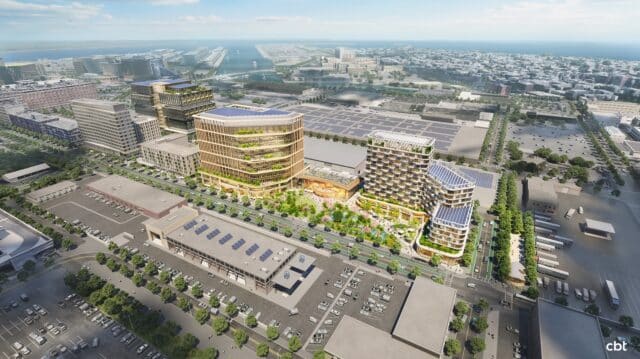
Cronin Development's proposal for a 1.6 million-square-foot development on the site of several South Boston parking lots owned by the Massachusetts Convention Center Authority. Image courtesy of Sasaki
The drama around a valuable piece of state-owned land in South Boston intensified last week, after the state convention center authority that controls the land got pushback from its board for recommending a developer through an allegedly opaque process and pulled a selection decision off its public meeting agenda.
On Saturday, Nov. 11, a Massachusetts Convention Center Authority selection committee informed Boston-based The Cronin Group that the authority would recommend them to redevelop 6-plus acres of land near the Boston Convention and Exhibition Center, according to emails obtained by the News Service. The developer on Wednesday even publicly announced that it has been named project “designee.”
But when the authority board met on Thursday it did not choose a developer for the project.
The mostly unbuilt 6-acre lot along D and E streets across the street from BCEC was taken by eminent domain in 2012 and 2013 to expand the convention center industry in the area. After owning the properties for over a decade, the MCCA opened a 30-day bidding period for the land last year, which resulted in backlash from South Boston officials who said the agency’s plan to lease the three parcels went against the purpose for which the land had originally been taken.
The 30-day bid period also drew concerns from a Gov. Maura Healey administration official who sits on the agency’s governing body, and the board decided to reopen the bidding over the summer.
The same two developers that had already submitted bids – Cronin Developers and Boston Global Investors – were the only two companies to submit new proposals in September for what they’d like to do with the land.
The developers’ plans outline projects that they say would bring thousands of jobs to the state and include everything from life science buildings, office space and grocery stores to a hotel and library (BGI’s plan) and arboretum, community health center and gallery focused on artists of color (Cronin Development).
Developer Pre-Designated?
On Tuesday, MCCA posted an agenda for its monthly board of directors meeting to be held on Thursday, which included a vote by the board to decide on entering a lease agreement with Cronin for the land.
The agenda-posting was the first time that BGI had heard that their bid wasn’t selected, chief executive John Hynes III said.
Now, BGI is alleging that the deal was pre-determined by the MCCA selection committee, appointed by Executive Director David Gibbons.
The Boston Business Journal first reported the tensions over the process, and MCCA board’s apparent rejection of agency staff’s decision.
“They’re entitled to select whoever they want, but at least have a process,” Hynes said. “This wasn’t a process. This was not a request for proposals. This was a pre-designation in the making.”
Cronin Development partner Linda Dorcena Forry says “this narrative that this was not fair, that somehow we had the upper hand, is false.”
During their Thursday meeting, the board did not ultimately take a vote on the development of the D and E Street land.
“This is not about the merits of any proposal,” said Chair Emme Handy. “The board does not yet have enough information to even understand that. No next steps, recommendations or selections can or will be finalized without the board’s approval and there is much for this board to learn before we can come to a decision.”

Boston Global Investors’ proposal for a 1.05 million-square-foot development on the site of several South Boston parking lots owned by the Massachusetts Convention Center Authority. Image courtesy of CBT Architects
Hynes: ‘I Was Shocked’
Both developers say they did not meet with anyone from MCCA to discuss their new proposals prior to the selection committee’s decision last weekend.
Spokespeople for MCCA did not respond to questions about pre-choosing the development company to lease the land.
Hynes said he only had contact with MCCA once since he filed BGI’s second proposal in September. He asked for an update in mid-October, he said, and the authority wrote back that he’d hear from them shortly.
“‘We haven’t finalized the schedule’ was the gist of their message back to me. And fine. So basically just sit back and wait. And the next thing I heard was two days ago, that the board meeting was meeting today, and they were going to review a recommendation for the Cronin Development proposal to go forward,” Hynes said. “Now that’s – that to me was a shock. I was shocked. I’ve been through these processes a number of times over my 40-year career, I’ve never seen anything like it.”
Forry said Cronin Development hadn’t been in touch with the agency. She said they did not give a presentation on their second proposal and hadn’t heard anything until they were notified over the weekend that their bid was chosen to be recommended to the board.
Since Cronin and BGI had already submitted proposals last spring and were the only developers to file a second round of plans, Forry said she believes neither of them were interviewed because they had already done the presentation process earlier this year.
“We were not interviewed. I believe the reason they probably didn’t interview the second round, is because they interviewed both groups the first round,” said Forry, a former state representative and senator.
Still, both proposals had changed from the initial plan they filed in the spring.
Cronin Development added the arboretum to their development plan, as well as a movie studio and expanded family engagement center. Forry said their proposal was focused on creating a diverse space for the South Boston community.
BGI added a hotel to their new plan, which Hynes said will benefit the convention center business in the neighborhood – which he says brings the development more in line with the purpose of the original land-taking.
Agenda Changes Swirled
After the original agenda posting for Thursday’s meeting was published, it was amended at least twice. The second version that went up online said there would be a presentation about the D and E Street development, but did not list Cronin Development by name. The final version of the agenda did not have any mention of the plan for the land.
After receiving the email Saturday night that their bid had been selected, Cronin Development issued a press release on Wednesday announcing that “it has been named designee for the development of the D and E Street parcels immediately adjacent to the Boston Convention and Exposition Center in the Seaport Neighborhood of South Boston.”
“We are thrilled to have been named designee for this incredibly important project,” D Street spokesperson Tavares Brewington said in the release. “We bid this project twice, illustrating our commitment to a fair and equitable process aimed at developing an important part of the neighborhood, while also creating a bridge across multiple communities. The vision we have for the space addresses the needs of stakeholders in the local community, communities of color, labor and government… It is illustrative of how far the city and Commonwealth has advanced. We are tremendously excited for the next steps in the process and to deliver for the people of Boston and our state.”
But come Thursday, the vote had been taken off the agenda.
State Administration and Finance Secretary Matthew Gorzkowicz sits on the board, and a majority of board members were appointed by Gov. Maura Healey.
Asked Thursday if the administration intervened to slow down the decision to offer the lease agreement to Cronin, spokesperson for the Executive Office of Administration and Finance replied, “It wasn’t the administration, it was the board.”
Board Overhaul Followed Earlier Controversy
When this same parcel of land was the subject of controversy in the spring, Gorzkowicz’s spokesperson said the secretary “as a member of the Massachusetts Convention Center Authority board, has expressed concerns to Executive Director Gibbons about the process used in the issuance of the RFP.”
Shortly afterwards, Healey overhauled the authority board, replacing most of its members with her own appointees.
New board chair Handy, appointed by Healey this summer, started Thursday’s meeting by saying she wanted to “address the issue of parcels D and E and the agenda for today’s meeting.”
She said the “prior board” scheduled the review of D and E Street proposals before the majority of the board’s 13 members were sworn in by Healey in July. Only four of the board’s current members were present for that discussion, she said.
“In the meetings since this board has been sworn in, we’ve heard several status presentations about the RFP process, mainly focused on what happens next after the parcel is awarded to a developer because of the timing of the RFP and our appointments,” Handy said. “The board has not engaged on the impetus for the RFP, how the RFP was constructed or how the authority planned to evaluate the bidders.”
She continued, “We’ve had little information shared about the key elements of the major decision for the authority. In my short time as board chair the body has demonstrated that as a board you are deeply committed to thoughtful, thorough, transparent engagement on the issues before us.”
Handy said she removed the topic of the D and E Street development from Thursday’s meeting agenda because of her concerns over “the depth of information provided to the board” and suggested that the governing body’s say in the matter of which bid gets picked needs to “go beyond superficial engagement.”
Cronin, BGI Both Hopeful
Forry was still hopeful after Thursday’s board meeting.
“We feel like we’re still in it, and what the board said is that they needed time because it’s a new board and people still wanted to review the proposal. And that’s fine, but our proposal has been open to the public since October, so everyone has had a look at both proposals. But in our mind, we believe that we won and we moved through the process,” Forry said. “Our proposal is serious about community, serious about DEI and serious about climate resilience. It was a fair process.”
Hynes, meanwhile, said he was encouraged by the board’s decision to hold off on a vote.
“How do they know, for example, that the competing proposal is not superior to the one they selected?” Hynes said, touting BGI’s experience as a developer in Boston and saying their proposal would benefit the South Boston neighborhood with the donated library space. “How do they know that, if they never met with the developer to discuss it? This was not a fair and level playing field at all.”






